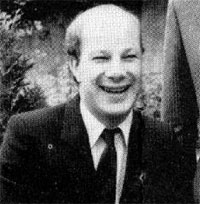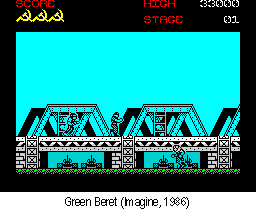|
Inside
Ocean
ZX Computing, May 1986
Ocean have just transplanted
their Manchester HQ to an unlikely setting. They are now sharing
a building with the Quakers. Does this mean a new departure
into religious computer games? ZX investigates.
"Nobody would be happier than me if someone walked in
here with a game they had been working on for six months in
an attic and presented us with the next big computer game."
 So
said David Ward (right), chairman of Ocean. There was
no knock on the door at that particular moment but even now
that computer games are big business anonymous programmers
can still rocket to overnight success. So
said David Ward (right), chairman of Ocean. There was
no knock on the door at that particular moment but even now
that computer games are big business anonymous programmers
can still rocket to overnight success.
Although the stream of amateur "attic" games of
marketable quality is dwindling to a trickle there are still
lofts in faraway places humming with inspiration. The story
of Ocean's bestselling game Movie is a case in point.
Dusko Dimitrijevic, a Yugoslav programmer, appeared on Ocean's
doorstep one day having come to England for an appointment
with another software house which folded just before his arrival.
Referred to Ocean he showed them the game he had completed
and, recognising his potential, he was given a brief to produce
a game in a Sam Spade vein. Some time later a parcel with
a Yugoslav postmark, containing Movie, dropped through
Ocean's letterbox.
Of course you don't have to scour Eastern Europe for top
programmers and in the basement of ocean's offices can be
found a team of in-house programmers assembling future releases.
Paul Owen, who oversees the development of Spectrum games,
gave us a guided tour of the cubicles sectioned off into banks
of hardware devoted to the Spectrum and Commodore. Another
room housed keyboards for writing music, while two other rooms
concealed some secrets. One was the room devoted to clandestine
software developments which was strictly off limits to all
but programming personnel. The other, nicknamed the Socialist
Room, was for purposes that could only be guessed at.
On the house
The average age of the in-house programmers is 19 and the
qualities needed to succeed were summed up by Paul as being,
"dedication, hard work and loyalty." "It's
not all glamour being a programmer," he added.
One aspect of the Quakers' code of clean living seems to
have rubbed off in that there's a total ban on alcohol on
Ocean's premises. Paul explained that the reason for the ban
was based on the need for efficiency. "Programming requires
complete concentration, drink and coding just don't mix."
Upstairs in the spacious, whitewalled offices, David Ward
spoke of Ocean's past, present and future.
"Ocean started three years ago and like many companies
we concentrated on mail order. It's interesting to see that
there's a move back to mail order as software for the more
obscure machines doesn't make it into the mainstream retailers
anymore.
"We are also finding a big mail order demand for our
IQ utilities range and it's nice in a way to have come full
circle with people waiting with bated breath for the arrival
of their jiffy bags."
David stressed that Ocean was set up as "a publishing
company rather than a software house.
"We took the view that software was a form of home entertainment
just like records and books and as a publisher we wanted to
cast our net as wide as possible so as not to exclude any
creative forces.
"We are in the business of manufacturing and selling
and unlike some software houses that were set up to simply
develop software we used our business acumen to sell into
the high street stores. The software houses that simply wanted
to develop games have been the casualties in the past few
years."
Even though Ocean has its in-house programmers it still relies
on outside programmers to provide much of the work and fresh
ideas.
"I don't think we could ever claim to determine what
the next thing in software is going to be. We've got perhaps
50 or 60 software writers doffed around the country and I
think that software development like any other creative process
depends on inspiration and writers need different sorts of
working environments to be innovative.
"Nowadays of course, many games for home micros are
developed on much bigger machines but I still feel that in
most cases the best games for, say, the Spectrum are produced
and written on the Spectrum.
"I think that Sinclair themselves have been surprised
at the capabilities still being found on the 8-bit machine
and its life expectancy will exceed the estimates of the critics."
Just Imagine
Unlike some expanding software houses Ocean have not adopted
a policy of devouring other companies. The exception was the
acquisition of Imagine.
"We bought the rights to use the Imagine label and a
couple of games like World Series Baseball which they
were developing. Imagine was a well known name even if it
was a notorious one and sales of Imagine games in Europe continued
to hold up despite the changeover."
Imagine became the imprint devoted to arcade games, in particular
conversions from Konami coin op games such as Yie Ar Kung
Fu, Hypersports and the forthcoming Ping Pong.
Ocean have plans to create another imprint to put alongside,
Imagine and the 19 series.
"We have some adventures in the Infocom mould for which
we will need a separate label. What we try to do is create
a brand to cater for a particular market. The last thing you
want to do is disappoint customers who have come to expect
a certain type of game from a particular label."
When it comes to licensing deals there is no waiting around
for tempting offers to materialise. Ocean have a string of
successful spin off games including Rambo and the soon
to be released V and Batman.
"Once we've got a licensing deal we have to find a team
to put it together and the problem there is that unlike straight
conversions there are a hundred different ways of doing it.
We leave as much to the programmers as possible in determining
the best treatment but the real constraints as always are
the constraints of the target machine itself:"
Even though the software industry seems to be evolving towards
fewer and larger software companies, David believes there
is still a chance for the independent small business to make
it work.
"There is still room in the industry for a person to
build a company on the strength of a single product:"
 While
at Ocean we were given a sneak preview of Green Beret,
another Konami conversion which carries the idea of "one
man against an army" to new heights. In the basement
there were various versions on show, the original Konami game
running as a constant reference point, a virtually complete
Commodore version and the graphics for the Spectrum game.
With comparison made easy it's evident that litile has been
lost in the translation from the original to the Spectrum.
All the game elements are present and only some colour detail
has been dropped. Your task as alone Green Beret is
to rescue four prisoners from the heart of the enemy compound.
The enemy is an anonymous Eastern bloc country although the
hammer and sickle symbols on the screen may give you a slight
clue. While
at Ocean we were given a sneak preview of Green Beret,
another Konami conversion which carries the idea of "one
man against an army" to new heights. In the basement
there were various versions on show, the original Konami game
running as a constant reference point, a virtually complete
Commodore version and the graphics for the Spectrum game.
With comparison made easy it's evident that litile has been
lost in the translation from the original to the Spectrum.
All the game elements are present and only some colour detail
has been dropped. Your task as alone Green Beret is
to rescue four prisoners from the heart of the enemy compound.
The enemy is an anonymous Eastern bloc country although the
hammer and sickle symbols on the screen may give you a slight
clue.
Armed only with a knife, rifle and a flamethrower which you
pickup along the way you are faced with guards, man eating
dogs, gyrocopters dropping bombs frorn above, and yet more
guards. If you are in the mood for a massacre Green Beret
will offer you the chance of maximum decimation for your money.
|